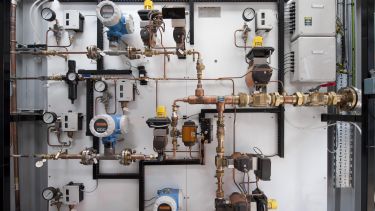Conventional power
Our research looks at ways to reduce and even eliminate carbon dioxide emissions from fossil fuel power plants and heavy industry.

Carbon capture, utilisation and storage
Carbon capture, utilisation and storage (CCUS) is a group of technologies designed to capture CO2 from emissions sources, such as fossil fuelled power plants, and prevent it from being released into the atmosphere. Once captured, the CO2 can be either re-used in various products, such as cement or plastics (utilisation), or stored permanently in geological formations deep underground (storage).
Why is it important?
-
In 2019, the UK government announced its support for Carbon Capture, Utilisation and Storage (CCUS) technology in both its and , recognising the key role CCUS can play in decarbonising the UK economy.
-
Without CCUS, the cost of meeting UK climate targets could double by 2050, according to the .
-
CCS helps retain jobs in the regions that rely on heavy industry and creates fundamental infrastructure for regional low-carbon clusters, which are at the heart of .
Our expertise and activities
-
We are a founder member of the .
-
We are the home of the , which enables industrial and academic partners both regionally and nationally to develop, demonstrate and test low-carbon energy technology solutions. The centre helps researchers and innovators to gain the necessary commercial confidence before committing to large scale trials for solutions that will remove and reduce carbon and introduce other energy sources like hydrogen and bioenergy.
-
We are the lead UK institution in the .
-
We host the UK Centre for Carbon Dioxide Utilisation (CDU) and manage CO2Chem – the world’s largest networking and research community for academics and industrialists interested in CO2
-
We are a partner in the (known as a Centre for Doctoral Training).
-
We manage and operate the , with links to sister facilities and expertise at Nottingham, Edinburgh, Cranfield and Imperial College London universities.
Research areas
-
Post-combustion capture
-
Oxyfuel combustion
-
Next generation capture technologies
-
Biomass co-firing
-
Computational Fluid Dynamic (CFD) modelling
-
CO2 transport in pipelines
-
CO2 utilisation in products
-
CO2 measurement and monitoring technologies
Bioenergy
As well as CCUS we also conduct research into Bioenergy. Bioenergy is generated from algae, crops, plants and trees through burning or conversion to liquids and gases.
Why is it important?
-
Bioenergy is the single largest renewable energy source, providing 10% of the world’s primary energy supply. It is hugely important in many developing countries.
-
The UK government has forecast that by 2020 biomass could generate 10% of the country’s current electricity supply, enough for around 8 million homes.
Our expertise and activities
-
We are developing new sources of biodiesel and seeking to improve the yields and sustainability of current crop-based biofuels.
-
We are developing new designs for anaerobic digestors (AD)
-
We have unique facilities to test biofuels in aviation turbines
Detailed research areas
-
Sustainable liquid biofuels from biomass refining.
-
Solar energy utilisation in bacteria.
-
Biorenewable fuels and materials.
-
Bioreactor enhancement using microbubble cloud generation from fluidic oscillation.
-
Integration of fluid dynamics with biological and physicochemical models.
-
Computational Fluid Dynamics (CFD) modelling of Anaerobic Digestion.
-
Development of a highly efficient waste to ethanol process and also applied to algal growth.
-
Dual mode plasma UV microreactor for ozonolysis and hydrogenation green chemistry.
-
Developmental biology of plants aimed to increase the economic potential of plants grown for biofuel.
-
Mechanisms of lignocellulose degradation by bacteria isolated from cattle rumen.
-
Fundamental investigations into combustion, gasification, and pyrolysis of biomass and the associated power generation systems.
-
Technology development and environmental assessment of alternative fuels for thermal power plants including biomass.
-
Development and testing of sustainable aviation fuels
We have a strong track record of cross-disciplinary leadership on energy sustainability, resource efficiency and the circular economy, creating future supply chains, systems and a society that is resource- and energy-efficient.
Contact
Get in touch to find out more: energyinstitute@sheffield.ac.uk
